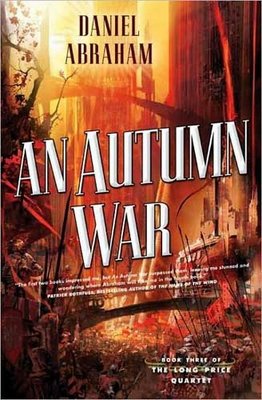The first two books of the Long Price Quartet are nifty and accomplished and I like them a lot, but An Autumn War is a whole new level of good. It’s about a war seen from both sides, and neither side is wholly right or wrong. The first two books established the world and the way the magic works. In this one we finally get to see more of the places on the maps, and we see the order of the world overturned and the possibility of magic almost driven out.
Everyone has sensible motivations, nothing is black and white, and best of all, it’s a fantasy novel, and you can’t tell ahead of time what’s going to happen.
I normally hate the theme of magic passing away. But Abraham has faced all along the idea that the particular magic needed to hold the andat is awful—it puts an appalling strain on the poet, it imposes slavery on the andat, and it holds a sword against the rest of the world. It allows the cities of the Khaiem civilization without soldiers or the threat of war, while the rest of the world must fear them. Nothing stops the poets from using the andat against the rest of the world. But nobody does it, and the andat’s primary uses as we see them are commercial—Seedless removes seeds from cotton, and Stone-Made-Soft works with mines and potters.
Balazar Gice is afraid of the existence of the andat because his country could be destroyed at any moment by whim, but nobody is planning to do it. He is out to save the world, but does the world really need saving? He causes an immense amount of suffering and slaughter against what is an ever-present threat, but a sheathed sword. The Empire caused immense destruction, but the Khaiem have had andat for nine generations without turning them on Galt or on each other. Besides, we have been on the side of the people of the Khaiem all along, they are the country and people we know from the earlier books, and still see here.
It’s very unusual to see both sides of a conflict done this way. Balazar makes terrific points against the andat. There’s one point where he’s looking at the Galtic steam wagons (steam tanks, essentially) and having a conversation about how they would never have been invented in the cities of the Khaiem, and even if they had harnessed the concept of carts that go without horses it wouldn’t have led to anything. He’s awfully persuasive, and the awful climax of An Autumn War in which all the Galtic men and all the women of the cities of the Khaiem are made sterile, is certainly a terrible example of how andats can go wrong. Otah comes around to Balazar’s point of view by the end. “Good men shouldn’t be able to make mistakes with prices this high.” But what we’ve seen isn’t that, before, but nine generations of peace and the andat used to increase prosperity.
This is a book about complex tortured people. There’s Otah and Maati and Liat, still twisted up by their original triangle and there’s Otah’s wife Kiyan. There’s Balasar Gice and his quest to save the world. And then most interesting of all there’s the mercenary captain Sinja, in love with Kiyan, who betrays everyone in turn. This is a wonderful book.










